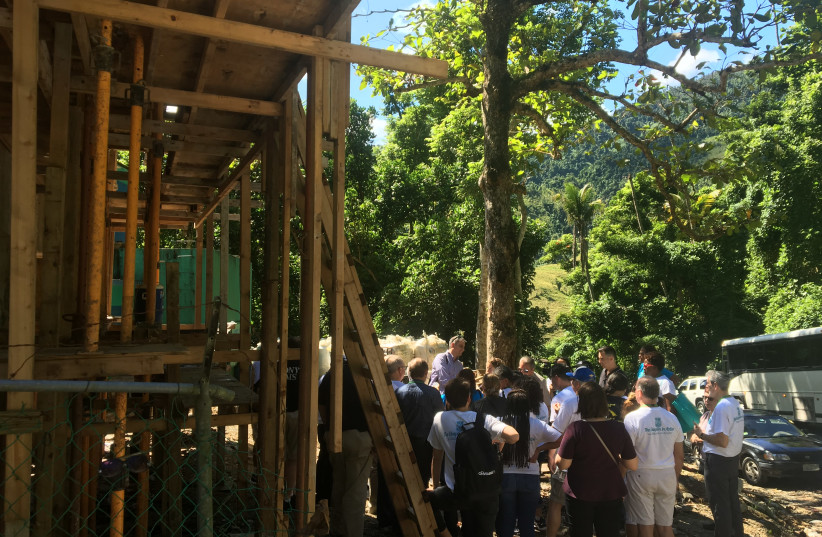When a small group of Israelis arrived in Haiti within 48 hours of a devastating earthquake hitting the island nation in 2010, it was awe-inspiring. They had traveled 6,500 miles, while the United States, situated much closer to the disaster, would take more days to assemble and deliver humanitarian aid.
The Israelis were dispatched by IsraAID, an organization founded in 2001 that has over the course of two decades developed into Israel’s leading non-profit humanitarian relief organization. The capacity to quickly mobilize skilled teams and supplies and transport them to points of disaster on most continents is remarkable. It is putting into action the Jewish tradition of responding generously and compassionately to those who suffer a natural disaster.
“We usually arrive on the ground within the first 72 hours to provide medical support, trauma counseling, access to clean water,” said IsraAID CEO Yotam Polizer at the group’s recent 20th-anniversary celebration in Tel Aviv.
Over those past 20 years, IsraAID has responded to a range of crises, including earthquakes, hurricanes, floods, and refugees in more than 50 countries, and is currently active in 14 countries.
What has long distinguished IsraAID from many other, and often much larger, relief organizations is its commitment to remain on-site long after the initial outpouring of support and attention.

“We stay in countries for periods of two, three years, and sometimes even for eight years to help the communities build back better, to help them rebuild their lives and develop community resilience,” Polizer said.
“Israel’s story is made up of the small stories of ordinary people doing extraordinary things,” Foreign Minister Yair Lapid told the in-person and online global audience participating in the anniversary celebration.
“When an Israeli doctor helps a child injured in an earthquake in Haiti, that’s Israeli pride,” Lapid declared. “When an Israeli team helps survivors of an earthquake-tsunami in Japan, that’s Israeli pride. When all the incredible work of IsraAID in Afghanistan is revealed one day, that will be a great source of Israeli pride.”
Through its compassionate humanitarian work, IsraAID has also helped build and reinforce positive views of Israel as a country prepared to help others. The group has reached countries, like Iraq and Indonesia, that do not have diplomatic relations with the Jewish state.
Most recently, IsraAID was key to organizing a rescue mission that evacuated more than 160 Afghanis, mostly women, who faced possible violent retribution by the Taliban, to safety in the UAE.
American Jews, too, can share in that sense of pride. My organization, American Jewish Committee (AJC), has been a partner of IsraAID since its inception and has donated to many of its relief efforts around the globe.
“At American Jewish Committee (AJC), we believe in responding whenever possible to humanitarian crises, empowering Israel in the process, and feeling confident about the expertise of the response teams,” says AJC CEO David Harris. “For us, that means partnering with IsraAID. They do outstanding, lifesaving work, as we know from years of collaboration, and we are proud to support them.”
Several AJC colleagues, based in Paris and Jerusalem, went to the Greek island of Lesbos in 2015 to work alongside an IsraAID team in providing direct assistance to Syrian refugees who were arriving there in large numbers after fleeing the Assad regime.
For IsraAID, the 2010 Haiti earthquake experience was “a game-changer,” explained Polizer. The Israeli team ended up staying in Haiti for eight years and was able to reconnect with Haitians they had previously trained when returning to the country in August after the latest earthquake.
IsraAID staff have stayed longer in other countries, too, notably in Japan after the massive earthquake that triggered a tsunami in 2011. Polizer led the IsraAID mission in Japan for seven years. And another team, working with victims of gender-based violence, has been in South Sudan since 2011.
More recently, the organization has taken on the fight against corona, partnering with the government of Eswatini to bring mass vaccinations to that small African nation.
“I’ve seen how being very nimble, very flexible, with a small but highly professional team enabled us to save lives, to be there first, to find very creative solutions,” noted Polizer.
The dynamism and versatility of IsraAID has positively helped dozens of countries, empowering local communities to confront a variety of crises and emerge more confident and stronger.
“In the end, your work contains the essence of Israeliness,” Lapid stated. “You meet people in the hardest moments of their lives, reach out to them and say: “we don’t leave anyone behind, no matter who you are, where you come from, or where you are going.”
IsraAID has demonstrated over and over that humanitarian aid is a crucial Israeli export that has an indelible global impact.
The writer is the American Jewish Committee’s director of media relations.
